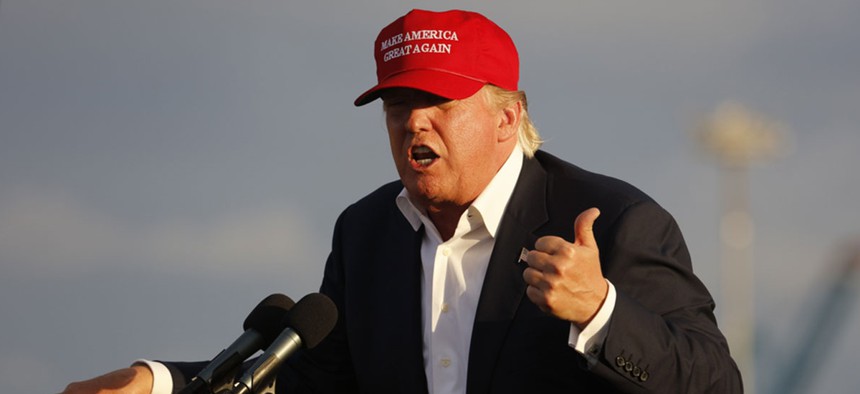
Joseph Sohm / Shutterstock.com
25% of Trump’s Political Spending Goes to His Own Companies
Trump's companies have already earned $1.4 million from his campaign.
“It’s very possible that I could be the first presidential candidate to run and make money on it,” Donald Trump told Fortune in 2000, during his first abortive run for president.
He was referring to a $1 million motivational speaking deal he got from Tony Robbins that he timed to coincide with his campaign stops. Then, he didn’t dominate the headlines—apparently the Clinton-Bush-Gore psychodrama was more compelling—and Trump’s greatest accomplishment was winning the Reform party nomination in California with a scant 15,311 votes. (His bon mots haven’t changed much—Fortune refers to “his usual critiques of Pat Buchanan (‘a Hitler lover’), Bill Bradley (‘a total disaster’), George W. Bush (‘no Einstein’), Fidel Castro (‘a bad guy’), North Korea (‘run by some very bad people’), and Russia (‘totally mixed up’).”)
This time around, as the leading candidate for the Republican nomination, he operates on a more rarified and lucrative plane: Trump’s companies have already earned $1.4 million from his campaign.
The billionaire builder often argues that his wealth guarantees his political independence, and describes his campaign as “self-funding.” That’s no longer true: While he was the main source of campaign funds during the early part of his run, the most recent financial disclosures through the end of September 2015, show Trump put less money into his campaign than his donors—and he stands to profit in particular from their backing.
Follow the money
Trump loaned his campaign just over $1.8 million during the second quarter of this year, but as of Oct 1. his campaign had spent $5.4 million. Most of the balance, $3.9 million, came from donors. Some contributions are “unsolicited,” in Trump’s words, but the rest comes from buying merchandise or clicking on the large “donate” buttons on his website. As of Trump’s last filing, there was only $250,000 left in the bank to run the the campaign and pay off the loan he made to himself, though he has surely raised more money since then.
Meanwhile, Trump’s various companies have contributed some $105,000 worth of services, including salaries for Trump’s pre-existing staff, including his feisty bodyguard, and, less explicably but more expensively, rent paid to his to luxury condo buildings in the heart of Manhattan: Trump Plaza and Trump Central Park South.
His campaign has also paid $160,000 to rent space at various Trump-owned buildings, including Trump Tower on 5th Ave. The campaign’s largest expenditure is $1.2 million to the private jet company that Trump owns in order to shuttle him around the US. All told, his campaign has paid Trump-owned entities $1.4 million, a little more than a quarter of all its spending.
Trump’s campaign did not respond to queries about how the billionaire decides between donating his company’s services to his campaign or using donor money to pay for them.
Different priorities
Unlike most candidates, who spend much of their money on television advertising, Trump’s other big-ticket items are to manufacture his iconic hats and t-shirts—which he sells to donors at a profit—and to pay lawyers.
It should be said that Trump’s spending is dwarfed by that of the other major candidates, who solicit quite a bit more money from rich people and corporate bundlers. Half of Donald Trump’s donors gave less than $250, while Senator Bernie Sander’s median donor gave $683. Trump’s campaign has been able to survive and indeed thrive on free media exposure by spending less than many candidates for state-wide office, let alone his rivals for the GOP presidential nomination.
So will Trump make a profit from his campaign? It seems likely that he raised more money in the last three months of the year than in previous quarters, as his staying power exceeded expectations. If he ramps up spending and goes all-in to win, he may not be able to repay his campaign loan. But if he keeps raising money and keeping costs low while funneling money into his own enterprises, it’s entirely possible he’ll make money as candidate.
And that’s not counting the intangible brand recognition he’ll gain from his nationwide platform, sales of his book—or the lucre on the speaking tour once his presidential term ends.
(Image via Joseph Sohm / Shutterstock.com )







